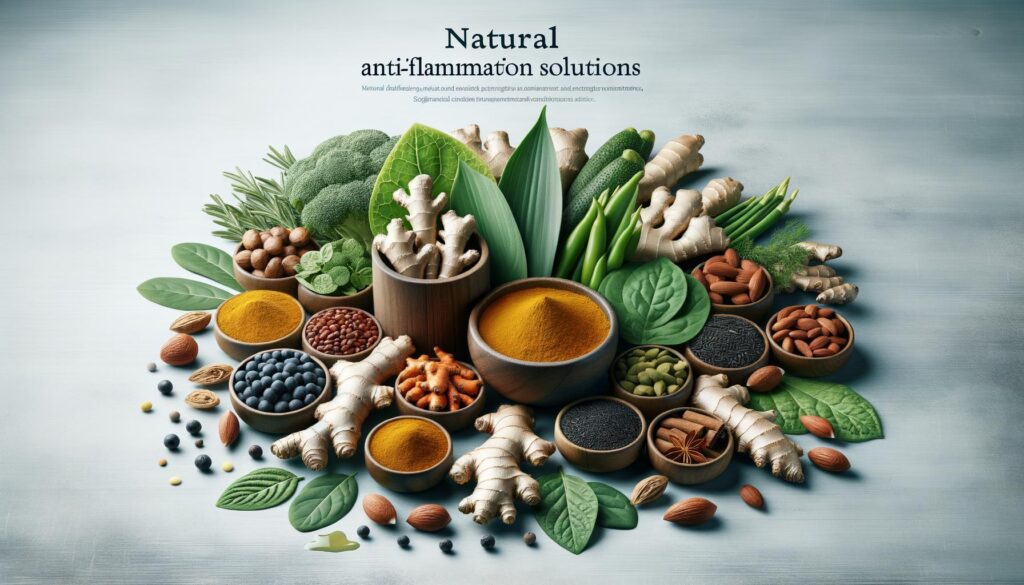Exploring Natural Anti-Inflammatory Solutions

Understanding Inflammation
Inflammation is a crucial part of the body’s immune response, acting as a defense mechanism against infections, injuries, or harmful stimuli. This response helps to repair tissues and fight against intruding organisms. While acute inflammation is beneficial, chronic inflammation can lead to various health problems, such as heart disease or arthritis. Understanding the difference between these types and their causes is essential in effectively managing and reducing inflammation in the body.
Dietary Choices for Reducing Inflammation
The foods we consume play a significant role in either increasing or decreasing inflammation. Adopting an anti-inflammatory diet can significantly impact your overall health. Key dietary components that have been shown to possess anti-inflammatory properties include:
- Fruits and vegetables: Rich in antioxidants and polyphenols, substances that may reduce inflammation.
- Whole grains: High in fiber, they may help lower C-reactive protein, a marker of inflammation in the blood.
- Healthy fats: Sources such as olive oil and avocado can provide essential fatty acids that combat inflammation.
- Fish: Fatty fish are high in omega-3 fatty acids, which have anti-inflammatory effects.
Incorporating these foods into daily meals can not only help in reducing inflammation but also enhance overall health.
Herbs and Spices with Anti-Inflammatory Properties
In addition to modifying dietary choices, certain herbs and spices have been revered for their ability to fight inflammation. They can be easily added to recipes or consumed as supplements for added benefits:
- Turmeric: Contains curcumin, a powerful anti-inflammatory compound.
- Ginger: Known for its ability to ease inflammation and pain.
- Garlic: Its sulfur compounds have anti-inflammatory effects.
- Cinnamon: Provides antioxidants and has anti-inflammatory benefits.
Regular use of these herbs and spices can make a difference in managing inflammation naturally.
Lifestyle Changes to Support Inflammation Reduction
Beyond dietary adjustments, certain lifestyle changes can contribute to reducing inflammation. Engaging in regular physical activity, for instance, has been shown to decrease inflammatory markers and improve immune function. Similarly, ensuring adequate sleep is paramount as poor sleep can exacerbate inflammatory processes. Stress management techniques like meditation and deep breathing exercises can also help manage stress hormones that may trigger inflammation.
Combining these lifestyle habits can promote a substantial reduction in inflammation, leading to improved quality of life.
The Role of Supplements in Managing Inflammation
For many individuals, taking natural supplements can complement dietary and lifestyle changes in managing inflammation. Popular supplements include omega-3 fatty acids, commonly found in fish oil, which help to reduce inflammation and support heart and brain health. Another option is bromelain, an enzyme from pineapples, known for its anti-inflammatory properties. However, it’s crucial to consult with a healthcare provider before introducing any new supplements to ensure they are safe and suitable for individual health needs.
These additional supports can offer an extra layer of protection against chronic inflammation.
Conclusion
Embracing natural solutions in the fight against chronic inflammation can lead to profound improvements in health and well-being. By understanding the types of inflammation and incorporating dietary, herbal, lifestyle changes, and supplements, individuals can empower themselves to manage inflammation holistically. It is essential for anyone considering these methods to approach them with consistency and under the guidance of a healthcare professional to ensure the most effective and personalized outcomes.
